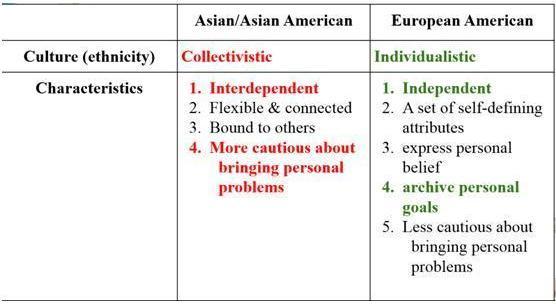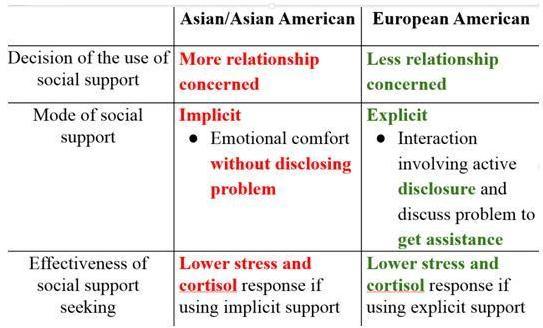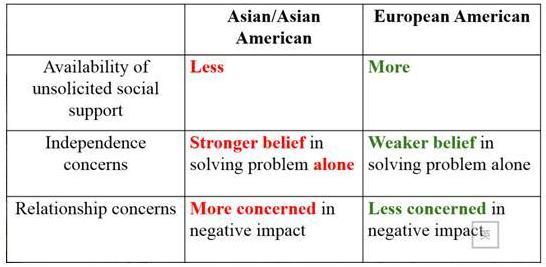Introduction
Social ties play important roles in a person’s life, and they have an impact on social support that people seek, receive, and give. In this paper, the notions of social ties and social support will be defined, and the importance of social support and how it might depend on the cultural background a person has will be discussed.
Social Support and Social Ties
Social ties have an important influence on a person’s psychological and physical condition. But before speaking about it, it is important to properly define the notion of social relationships. It is possible to adopt the definition of this term as offered by Thoits (2011): social ties are “connections to and contacts with other people through membership in primary and secondary groups.”
Such connections might have both positive and negative impacts on a person’s well-being. If these ties positively affect the individual’s well-being, it will be said that they provide social support to that individual.
Social support “typically refers to the functions performed for the individual by significant (i.e., primary) others and secondary group members” (Thoits, 2011). Therefore, people who have strong social ties often can offer the most immediate support to an individual should they need it.
It is also important that the ways social support is sought and provided vary in different cultures. They depend on numerous factors but are related to the strength and the type of social relationships that are most often formed between representatives of that culture, and the perception of these relationships by these representatives.
The Importance of Social Support
Interactions between people who are socially tied to each other play an essential role in a person’s well-being, influencing both their psychological and physical condition. For instance, people who have problems in their lives often depend on others to help them cope with these problems and the stress that they cause. Social support offered by others significantly influences a person’s state of mind and often proves crucial in determining that person’s feelings and actions. Taylor (2011) notes that “social support, whether in the form of tangible assistance, advice, information, empathy, or love, is widely utilized as a beneficial means of coping,” thus emphasizing the fact that social support is capable of helping a person to deal with their problems related to a wide range of aspects of their life. Furthermore, “social support acts as a moderator of stress.
It reduces psychological distress such as depression or anxiety caused by stress” (Kim, Sherman, & Taylor, 2008); it shows that social support often becomes crucial when a person is experiencing serious problems that lead to psychological unease or anxiety. Noteworthy, Shields (2004) also reasons that social support offered to an individual has a strong reverse association with the level of stress the individual experiences. In fact, Kim et al. (2008) state that social support is one of the most effective mechanisms for dealing with stress. Strong social support is also proven to be effective in dealing with the psychological consequences of serious diseases (such as HIV-infection) by lowering the rate of anxiety in patients (Chan et al., 2007).
Interestingly, Kuo (2013) utilizes the notion of collective coping, which demonstrates that individuals within a group may develop collective coping behaviors. These behaviors are, clearly, related to the types of social ties existing between the members of the group. Of course, the type and methods of coping that live inside a particular collective are highly dependent upon several various factors, such as the nature of the relationships between the members of that collective and the quality of the problems which cause the stress that they are attempting to cope with. The kinds of relationships inside different groups vary not only depending on the type of the group but also on the general cultural context that the group exists in. Therefore, to be able to more clearly determine and describe the nature and the origins of the coping mechanisms in a group, it is also important to be aware of the cultural context the group has developed in.
Differences between People with an Asian Background and European Americans in Social Support Issues: A Literature Review
It was mentioned that different cultures lead to different mechanisms of coping with stress and various types of social support provided or sought by the members of a group. Now, an example of such cultural distinctions and their results will be considered by examining two cultures that both are present in America, but differ in a number of aspects. These are people with an Asian background (in particular, Asian Americans) and European Americans.
A review of a number of studies has shown that the two groups differ in both the kind of support that their representatives look for and in the way they seek that support. Mortenson (2009) found out that both Americans and Chinese might look for help from people whom they trusted, and might show emotional distress to their friends; still, Chinese participants associated being reserved with good manners more than non-Chinese Americans did.
There is also a difference in the amount of social support being sought. Another study by Mortenson (2006) discovered that Chinese college students who experienced academic failure were less likely to seek emotional help from others and more likely to adhere to avoidance than European American students, even though both groups believed that looking for emotional support was a healthier way to handle such emotions. Taylor et al. (2004) were able to learn that Koreans and Asian Americans tend to rely on social support much less than European Americans when it comes to the problem of dealing with stress. Furthermore, it was found out that Asian immigrants differ from American-born Asians in the amount of social support they look for; the latter tend to use social support more than the former, but the difference is not significant. On the other hand, the difference between both groups of Asian ethnicity and the group of European Americans was much more significant.
It is reported that European Americans rely on social support much more than people with Asian origins. In particular, Asian-originating participants much more often said that looking for social support would interfere with group harmony, that sharing problems with others would only exacerbate them, that there is a possibility that others will not understand one’s problems, that a person is responsible for their own problems, and that sharing problems would potentially cause criticism from others and the loss of face (Taylor et al., 2004, p. 359). Taylor et al. (2004) further prove that these concerns among Asians and Asian Americans are related to possible complications in relationships inside the group (and not, for instance, to independence concerns) (p. 360). Therefore, it appears justified to state that the type of relationships which exist in the communities comprised of Asians and Asian Americans in the USA discourages their members from seeking social support, for these members are afraid of the possible harm that could be done to their relationships.
This difference between the two cultures is a result of the fact that Asian culture is more collectivistic than the American one (Kim et al., 2008). Kim et al. (2008) reason that, due to this fact, Asians and Asian Americans are more likely to benefit from indirect forms of social support, ones that do not include an explicit exposure of the person’s feelings and concerns. The use of the implicit forms of support has been shown to result in different psychological and physical (salivary cortisol) reactions than the use of the explicit forms in Asian Americans and Asian immigrants; they experience less stress and have lesser levels of salivary cortisol when using indirect forms of social support. Conversely, European Americans experience less stress and have lower levels of salivary cortisol when using direct forms of social support (Kim et al., 2008).
Therefore, it can be seen that different cultural values affect stress coping strategies employed by people. While European Americans, being a part of a more individualistic culture, prefer direct forms of interaction and social support, Asian immigrants and Asian Americans show more favor to the types of social support which do not involve direct disclosure of their feelings to others.
These results could be compiled in several tables for clearness. See Figures 1-3.



Analysis of the Ways Asian and European American People with HIV Use Social Support
Now that the cultural differences between Americans of Asian origins and European Americans, which influence social support, were elaborated, it is useful to analyze a concrete situation that is affected by these differences. The ways that people with HIV infection use social support to cope with the stress caused by their diagnosis will be examined.
Sun, Zhang, and Fu (2007) researched a group of individuals in a Chinese care center and found out that the most common social mechanism of coping with stress resulting from AIDS diagnosis was a confrontation. Notably, the participants had low social status and poor levels of education.
Yang et al. (2015), who conducted another research in China, point out that direct social support must be preceded by disclosure of a person’s HIV-positive status to others, while implicit social support is gained via social networks without exposing one’s problem. Interestingly, Yang et al. (2015) found out that implicit social support supplies better chances for the mental health of an infected Chinese person. In contrast, explicit social support does not provide any positive predictions regarding mental health.
Chin and Kroesen (1999) conducted research among Asian/Pacific Islander HIV-positive females. The scholars remind that the disclosure of the status potentially threatens a diseased person with social stigma, discrimination, and rejection; furthermore, it is noted that such topics are considered taboo in Asian cultures. The study found out that the members of the sample were affected by the fears of disclosure and the negative consequences of it. The participants also feared to disappoint and burden others; it is noted that the stigma appears to have some roots in the Asian culture (Chin and Kroesen, 1999, p. 233).
Watkins-Hayes (2013) studied how American women (with no regard to their ethnicity) used the services of AIDS Service Organizations (ASOs). The study discovered that the impoverished women used ASOs more willingly because this was generally beneficial for their social status; at the same time, middle-class women were more reluctant to use ASOs, for it lowered their social status and made them vulnerable to HIV-specific social isolation. Interestingly, there is a similarity between this situation and the one described by Sun et al. (2007), for, as it was said, the latter found out that a confrontation was most commonly used among Chinese people with low education from poor families. It might mean that, despite cultural differences, socioeconomic status also has an essential influence on the ways that people use social support to cope with HIV-associated psychological problems.
Turner-Cobb et al. (2002) researched psychosocial outcomes of adjustment to HIV-infection and AIDS in a sample comprised of American people. (Out of more than 100 participants, only 2 had an Asian background.) It was found that the people who are more open regarding their HIV status have a better chance to adjust to their HIV status positively. This comes in direct contrast to the results obtained by Yang et al. (2015), who, as it was mentioned, found out that being explicit about one’s HIV-positive status in China does not provide better chances to be mentally healthy.
Mason, Simoni, Marks, Johnson, & Richardson (1997) conducted a study among African American and European American men. He found out that European Americans were more likely to tell others about their status, but that there were no differences based on the ethnicity in the reactions of people to whom the participants disclosed. Generally, the persons informed about the HIV-positive status of the participants reacted by offering support. It might be suggested that, while there is a difference between the social support used by Chinese or Chinese Americans and European Americans, such variation is insignificant when it comes to European Americans and African Americans.
It appears, therefore, that people with an Asian background are more reluctant to disclose their HIV-status to others, even to those with whom they have strong social ties (Chin and Kroesen, 1999). Besides, European Americans tend to react better to social support related to the positive HIV status, and this social support yields better outcomes (Turner-Cobb et al., 2002). On the other hand, for people with an Asian background, open social disclosure is not associated with better social outcomes, whereas implicit support leads to better health predictions (Yang et al., 2015). People with an Asian background are also more afraid of the possible consequences of disclosing their status (Taylor et al., 2004). Because Chinese college students and American college students admit that seeking social support is a more healthy way to deal with problems than resorting to avoidance (Mortenson, 2006), it might be likely that the general tendency of Asian Americans to avoid looking for social support openly could result in more negative psychological outcomes for these people.
Conclusion
Therefore, the types of social relationships that exist between people have an essential influence on social support that people seek, give, and receive. The specifics of social relations are often determined by cultural background. For instance, individuals with an Asian history are less likely to disclose their problems and seek the respective type of social support than European Americans, even when it concerns issues such as HIV-infection, which leads to different physical and psychological outcomes.
References
Chan, I., Chan, E., Au, A., Leung, P., Li, P., Lee, M. P.,…Yu, P. (2007). Subjective memory complaints of Chinese HIV-infected patients in Hong Kong: relationships with social support, depressive mood and medical symptoms. AIDS Care, 19(9), 1149-1156. Web.
Chin, D., & Kroesen, K. W. (1999). Disclosure of HIV infection among Asian/Pacific Islander American women: Cultural stigma and support. Cultural Diversity and Ethnic Minority Psychology, 5(3), 222-235.
Kim, H. S., Sherman, D. K., & Taylor, S. E. (2008). Culture and social support. American Psychologist, 63(6), 518-526.
Kuo, B. C. H. (2013). Collectivism and coping: Current theories, evidence, and measurements of collective coping. International Journal of Psychology, 48(3), 374-388. Web.
Mason, H. R., Simoni, J. M., Marks, G., Johnson, C. J., & Richardson, J. L. (1997). Missed opportunities? Disclosure of HIV infection and support seeking among HIV+ African-American and European-American men. AIDS and Behavior, 1(3), 155-162.
Mortenson, S. T. (2006). Cultural differences and similarities in seeking social support as a response to academic failure: A comparison of American and Chinese college students. Communication Education, 55(2), 127-146. Web.
Mortenson, S. T. (2009). Interpersonal trust and social skill in seeking social support among Chinese and Americans. Communication Research, 36(1), 32-53. Web.
Shields, M. (2004). Stress, health, and the benefit of social support, Health Reports, 15(1), 9-38.
Sun, H., Zhang, J., & Fu, X. (2007). Psychological status, coping, and social support of people living with HIV/AIDS in central China. Public Health Nursing, 24(2), 132-140.
Taylor, S. E. (2011). Social support: A Review. In M. S. Friedman (Ed.), The handbook of health psychology (pp. 189-214). New York, NY: Oxford University Press.
Taylor, S. E., Sherman, D. K., Kim, H. J., Jarcho, J., Takagi, K., & Dunagan, M. S. (2004). Culture and social support: Who seeks it and why? Journal of Personality and Social Psychology, 87(3), 354-362. Web.
Thoits, P. A. (2011). Mechanisms linking social ties and support to physical and mental health. Journal of Health and Social Behavior, 52(2), 145-161.
Turner-Cobb, J. M., Gore-Felton, C., Marouf, F., Koopman, C., Kim, P., Israelski, D., & Spiegel, D. (2002). Coping, social support, and attachment style as psychosocial correlates of adjustment in men and women with HIV/AIDS. Journal of Behavioral Medicine, 25(4), 337-353.
Watkins-Hayes, C. (2013). The micro dynamics of support seeking: The social and economic utility of institutional ties for HIV-positive women. The Annals of the American Academy of Political and Social Science, 647(1), 83-101. Web.
Yang, J. P., Leu J., Simoni J. M., Chen, W. T., Shiu, C. H., Zhao, H. (2015). ‘Please don’t make me ask for help’: Implicit social support and mental health in Chinese individuals living with HIV. AIDS and Behavior, 19(8), 1501-1509.